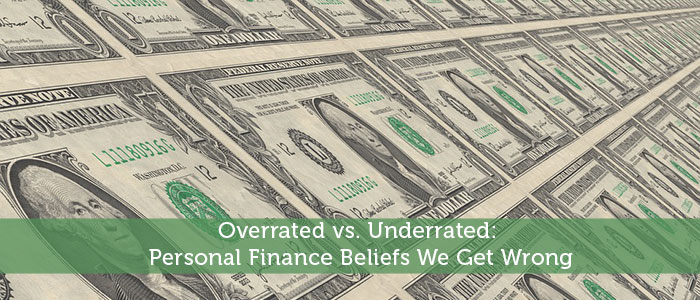What financial advice actually makes a difference? What ideas and strategies do we tend to overvalue?
Here’s my take on a few common personal financial beliefs we get wrong:
Overrated: Beating The Market
Underrated: Maximizing Savings Rate
Investors measure themselves against market averages. The Dow Jones and S&P 500 are common benchmarks investors try to beat.
Those who beat the market in any given year, we shower with attention.
The problem is few, very few, succeed over their entire life.
If you want more return from your investments, a better strategy is to increase your savings rate.
It’s 100% in your control.
Overrated: Constant Monitoring
Underrated: Quarterly/Yearly Reviews
Personal finance apps make tracking investments and net worth easy. But does this constant monitoring help you achieve your financial goals?
Not necessarily.
We tend to overreact to small deviations from normalcy. Behavior science calls this the overreaction bias.
If the market goes down three days in a row we conclude catastrophe is near.
Knowing the value of your portfolio and net worth can help you make better decisions. But a constant monitoring of these numbers can hurt more than help.
Overrated: Passive Income
Underrated: Finding A Fulfilling Job
There’s nothing wrong with passive income. The reason why it’s overrated is the degree of difficulty.
Most underestimate the time, effort, and money required to make it “passive.”
What’s underrated?
Finding work that fulfills you. Work you enjoy doing, with people you enjoy being around.
Overrated: Things
Underrated: Experiences
A new phone, sofa, computer offers immediate gratification.
The problem is this type of gratification wears off fast. We then return to our original state, believing the next “thing” will be the one that makes a difference.
Experiences, on the other hand, have a lasting impact on your overall well-being. They can change who you are. They can give you a different perspective on life.
They make a great investment.
Overrated: Focusing on Expenses
Underrated: Focusing on Income
If the goal is to increase the gap between your income and expenses, we tend to look first to cutting expenses.
At first cutting your expenses by 10% one month can be easy. But the task gets progressively harder. There’s only so much room to cut month-after-month. Pretty soon, you’re spending hours to cut $25 from your grocery spending.
What’s hard at first is increasing your income; whether that be through starting to freelance, taking on a 2nd job, or working more hours, it’s hard to get started.
But unlike cutting expenses, it gets progressively easier and the upside is unlimited.
Overrated: Over Optimization
Underrated: Simplicity
Shopping insurance every six months sounds tempting. So does switching to a bank offering an interest rate that’s 20% higher than the one you have. Ditto with going to three grocery stores to save $12.
While these strategies may improve your financial situation, they come at a cost.
There’s a concept in behavior science called decision fatigue. The theory is the more decisions we make, the lesser quality they become.
There are times in life when finances must be a high priority. When careful thought must go into how you manage your money. But you must be careful not to let this period last to long.
Implementing systems to cut down on decisions is always underrated.
Conclusion
Now it’s your turn.
These are the common beliefs I feel we tend to get wrong.
What are yours?
*Thank you to James Clear who inspired this article.
Author Bio: R.J. Weiss is a CFP™ and founder of the blog The Ways To Wealth. His work has featured in Bloomberg, Mint, and Investment News. Visit his blog today for actionable, proven personal finance tips and strategies.




